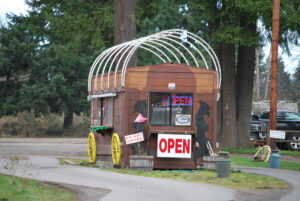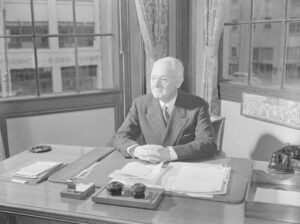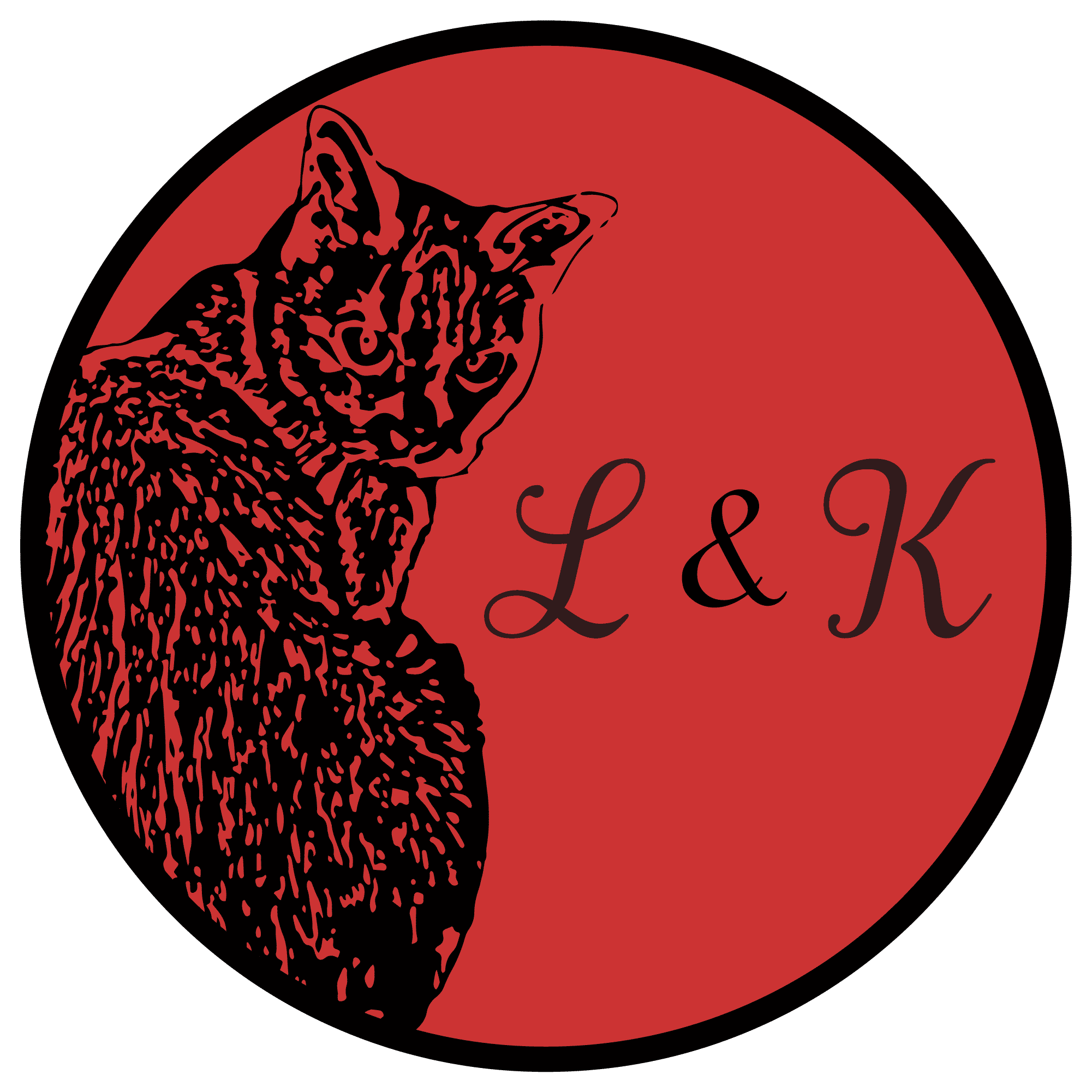In 2011, I moved from Kansas City to Washington State for a few years. I knew that coffee was reputedly a major part of Pacific Northwest culture—let’s join Frasier at Café Nervosa!—but I was surprised to find that coffee was part of just about everything. At work, employees gathered around the coffee maker, not the water cooler. Major retailers included coffee shops in their stores, along with entire aisles devoted solely to coffee. Stores like Seattle Coffee Gear sold nothing but coffee products, and Starbucks seemed to be everywhere. And not just Starbucks. The Pacific Northwest was dotted with a myriad of coffee shops, including drive-thru coffee stands, a novelty to this Midwesterner. In the Kansas City coffee landscape of 2011, it could be challenging to find a Starbucks, let alone a drive-thru coffee stand.

Happy Trails Espresso In McKenna, Washington. (Photo taken by author.)
Fascinated by coffee’s dominance in Pacific Northwest culture, I set out to learn more. I checked out Seattle’s Coffee Crawl, which featured unique coffee shops serving up amazing cups of java that rivaled anything on Starbucks’ menu. And who knew that there were so many ways to make coffee?! French press, pour over, siphon, cold brew…all yielding perfect cups of coffee often topped with little works of latte art. Seattle’s baristas are talented!
A visit to Starbucks’ headquarters offered a look at coffee roasting, along with a museum of Starbucks’ history. And, while exploring the countryside, driving on any major road in the Pacific Northwest usually led to a charming drive-thru coffee stand serving such tasty cups of joe that I quickly learned why Pacific Northwest coffee is hailed as superior. It IS superior, whether it comes from Starbucks or one of Starbucks’ many, many competitors.
When I arrived in the Pacific Northwest, I didn’t like coffee! At that point, in the Kansas City area, most coffee was a bitter swill drank as a last resort when I was too groggy to get through the day without it. By the time I left the Pacific Northwest to return to Kansas City, I was as in love with coffee as any Pacific Northwesterner and now, I can’t imagine starting a day without coffee. Thank goodness Pacific Northwest coffee culture has spread to Kansas City!
Before I went to Washington, like many Midwesterners, when I thought of coffee in the Pacific Northwest, I thought of Starbucks. I quickly learned that Pacific Northwest coffee culture is about so much more than just Starbucks, and a forgotten part of that culture is Manning’s. One afternoon, I stopped by Seattle’s Museum of History and Industry and found a reference to Manning’s. After a little research, I learned that in 1908, the Manning brothers opened a coffee stand in Seattle’s Pike Place Market, just a few doors away from where Starbucks’ founders later opened their first coffee shop. With coffee as the foundation, the Manning brothers launched a hugely successful coffee and restaurant business that operated for 76 years.
At first, I was motivated to learn more about Manning’s because of their coffee and its impact on Pacific Northwest coffee culture. (This will be part of the story in an upcoming book.) But as I dug deeper, I found that Manning’s offered a compelling story for many reasons. For example, the company provided reemployment to World War I and II veterans long before required by the Uniformed Services Employment and Reemployment Rights Act. Manning’s offered jobs for women, including management positions, in the 1940s and 1950s when most women had few opportunities outside of homemaking. Manning’s business model framework provides a formula for success that is relevant across the ages and can be an excellent blueprint for today’s businesses as they chase the American dream.
But most of all, Manning’s story is compelling because of good ethics. The Manning brothers and other family members who led the company were nice guys who made ethics a priority…and they didn’t finish last. As Gertrude Frederick, one of Manning’s female managers, explained in a 2014 interview, “The Mannings were grand people…they were interested in us (Manning’s employees) as human beings. They liked people and they liked working with people. And they wouldn’t have had to because they had money.” (To learn more, including Mrs. Frederick’s story, please take a peek at our book, “Manning’s: A Formula for Success.” This quote comes from page 237.)

Edward Manning sits at his desk in Manning’s San Francisco headquarters. (Photo circa 1950s and courtesy of the Stuart Miller Collection, Washington State Historical Society.)
So, in business, the Manning family did the right thing just because it was the right thing to do? Manning’s was a company grounded in ethical leadership, and this was the cornerstone of Manning’s phenomenal success. I find this refreshing. In today’s world, it seems too often that we eschew ethical behavior and do whatever it takes to win or just get what we want. Sometimes, unfortunately, decency and kindness seem to be in short supply.
Aside from Manning’s contributions to Pacific Northwest coffee culture, one reason I helped write Manning’s story is because it reminds us that ethics matter. And yes, we can be ethical AND successful. As young men, the Manning brothers floundered as they tried to find their niche in the business world. But they remained true to their ideals and ultimately achieved incredible success.
Perhaps it shouldn’t be a surprise that a family who made ethics a priority staked their success on coffee. After all, coffee’s history is intertwined with ethics, from the 1600s, when European coffeehouses became planning centers for social reform, to today, when coffee ethics often centers on fair trade and promoting economic prosperity in developing countries that produce coffee.
This blog will focus on coffee as a drink, as well as coffee as a social conductor. This blog also will focus on ethics and the importance of good ethics in developing and sustaining strong, healthy communities. Coffee and ethics go together, and I hope you’ll explore this connection with me.
But first, let’s relax and have a cup of coffee. Thanks to Manning’s, and later Starbucks, Pacific Northwest coffee culture has spread throughout the United States and North America, and a good cuppa joe can be found in almost any city. Wherever you are, I hope your day is brimming with hope and good times made even better by a tasty cup of coffee…unless you don’t like coffee…then try tea…or water…or soda…or…just enjoy your day!
Copyright ©2023 Locke & Kant, LLC


